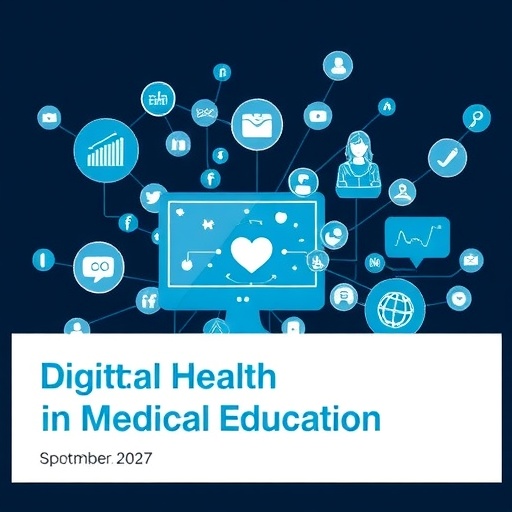The integration of digital health into medical education curricula has emerged as a critical topic in contemporary medical training. As technology continues to evolve at a breathtaking pace, the ability of educational institutions to incorporate these advancements into their teaching methodologies becomes increasingly important. A recent scoping review conducted by Tumuhimbise, Theuring, and Atukunda provides a comprehensive exploration of the enablers and challenges associated with this integration. The findings of this research underscore not only the potential benefits of digital health tools but also the various obstacles that educators and institutions must confront.
Digital health encompasses a wide range of technologies, from telemedicine and mobile health applications to artificial intelligence-based diagnostic tools. As these technologies proliferate, there is a pressing need for medical curricula to adapt accordingly. This adaptation serves not only to enhance the educational experience of medical students but also to better prepare them for the realities of modern medical practice. However, this transformation is fraught with challenges that can impede the successful integration of digital health initiatives.
One of the primary enablers identified in the study is the growing recognition among academic leaders of the importance of digital competencies in the healthcare workforce. As healthcare systems around the world increasingly adopt digital solutions, faculty members are beginning to advocate for the inclusion of digital health topics in medical education. This shift in mindset is essential for driving curriculum changes. Furthermore, proactive efforts by universities to develop partnerships with technology companies can facilitate the integration of innovative solutions into their educational framework.
Despite these positive signs, the research also highlights significant hurdles that remain. One major challenge is the lack of standardized digital health programs within medical education. This absence of uniformity can lead to variability in how digital health is taught, resulting in disparities in knowledge and skills among graduates. Institutions may find themselves competing not only with one another but also against rapidly evolving technology, which can lead to educational content that quickly becomes outdated.
In addition to curriculum standardization, the study emphasizes the need for adequate faculty training. Many instructors may not be well-versed in digital health technologies, which can hinder their ability to teach these concepts effectively. To address this issue, medical schools must invest in continuous professional development programs tailored to digital health. Such initiatives would ensure that educators remain knowledgeable and confident in their ability to teach these emerging subjects.
Another significant finding of the scoping review is the importance of access to technology. Students in some regions may have limited access to the latest digital health tools or even basic internet connectivity. This digital divide can exacerbate inequalities in medical education and training. As institutions strive to integrate digital health into their curricula, they must also consider how to provide equitable access to the necessary technological resources for all students.
Furthermore, the study suggests that incorporating digital health into medical education curricula presents unique opportunities for experiential learning. By utilizing simulations and real-world applications of digital health technologies, students can develop practical skills while simultaneously enhancing their theoretical knowledge. Such experiences can foster critical thinking and problem-solving abilities, which are essential traits for future healthcare professionals.
The scoping review also underlines the importance of student engagement in the curriculum development process. By soliciting feedback from current medical students, institutions can create a curriculum that is not only relevant but also resonates with the learners’ needs and interests. This participatory approach can enhance the overall educational experience while ensuring that the digital health components reflect the realities of contemporary medical practice.
As medical education institutions embark on this journey toward integrating digital health, they must also be mindful of the ethical implications associated with these technologies. Issues related to data privacy, security, and informed consent must be thoroughly examined and addressed within the curriculum. Educators have a responsibility to equip students with knowledge about these ethical dilemmas and foster critical discussions on how to navigate them in practice.
In light of the COVID-19 pandemic, the urgency of adopting digital health solutions has intensified. Telehealth, for instance, has witnessed exponential growth as healthcare systems have had to adapt to remote service delivery models. This accelerated adoption serves as a sobering reminder of the imperative to prepare future healthcare professionals to effectively leverage digital health tools in various clinical settings.
Moreover, the study calls attention to the need for ongoing research and evaluation of digital health integration efforts. As educators implement new curricula, it is essential to monitor their effectiveness and impact on student learning outcomes. By systematically evaluating these initiatives, educational institutions can refine their approaches and ensure that they continue to meet the evolving needs of healthcare delivery.
Finally, the authors advocate for the establishment of a global community of practice focused on digital health education. Such a network could facilitate the exchange of best practices, resources, and strategies among medical schools and healthcare organizations worldwide. Collaboration across borders would not only enhance the quality of education but also contribute to building a more robust, technology-savvy workforce capable of addressing complex health challenges.
This scoping review by Tumuhimbise, Theuring, and Atukunda serves as a pivotal entry point for understanding the enablers and challenges of integrating digital health into medical education curricula. As digital health continues to reshape the healthcare landscape, the insights gleaned from this research provide a roadmap for academic institutions seeking to navigate this uncharted territory effectively. Embracing the opportunities while addressing the challenges will ultimately be key to preparing the next generation of healthcare professionals for a digitally driven future.
Subject of Research: Integration of Digital Health into Medical Education Curricula
Article Title: Enablers and challenges of integrating digital health into medical education curricula: a scoping review
Article References:
Tumuhimbise, W., Theuring, S., Atukunda, E.C. et al. Enablers and challenges of integrating digital health into medical education curricula: a scoping review.
Discov Educ 4, 316 (2025). https://doi.org/10.1007/s44217-025-00793-z
Image Credits: AI Generated
DOI: 10.1007/s44217-025-00793-z
Keywords: Digital Health, Medical Education, Curriculum Integration, Enablers, Challenges




